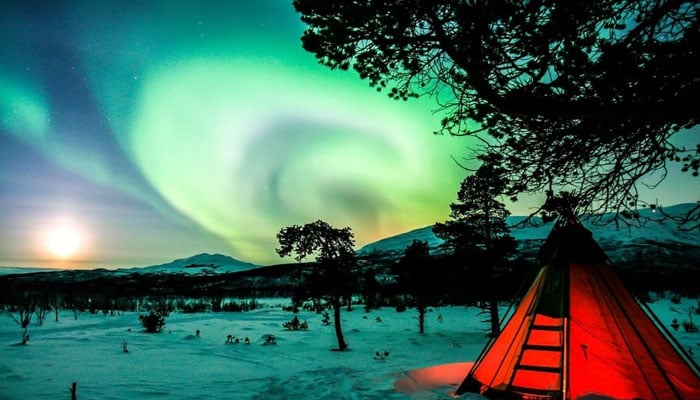Swedish scientists light up sky for northern lights research
Northern lights, known as aurora borealis or polar lights, appear as swathes of blue, green and purple lights in sky
STOCKHOLM: Scientists in Sweden put on a light show in the night sky on Thursday, releasing material from a sounding rocket to research the spectacular northern lights phenomena.
The northern lights, also known as aurora borealis or polar lights, appear as swathes of blue, green and purple lights flickering and dancing across the sky.
They can occasionally be seen across the Arctic on clear nights.
Researchers at the Swedish Institute of Space Physics sent up the rocket from the Esrange Space Centre in the country’s far north, releasing materials similar to those in fireworks into the sky at an altitude of between 100-200 kilometres (62-124 miles).
Waves of greenish-white lights could be seen across the dark sky just after 1830 GMT above the northern Swedish town of Kiruna and within a 200-kilometre radius.
Somewhat less spectacular than the real northern lights, the experiment ended up blocking out a real aurora borealis occurring naturally.
The experiment was part of aurora research aimed at helping scientists improve near-space weather forecasts to protect satellites and critical infrastructures.
"People nowadays cannot imagine life without GPS, without TV, without satellite TV, without mobile phones and so on. And to have all of this, we need to understand space weather," Tima Sergienko, lead scientist of the experiment, told AFP by telephone before the launch.
"In some cases when we have strong ionic activity, all this stuff can be destroyed due to space weather," he explained.
In the experiment, barium was released from aluminium cylinders to create the effect.
Similar experiments have been carried out around the world for decades, but Sergienko noted that technology and cameras were much more advanced now.
Researchers "can get much more information from such experiments and from optical measurements", he said.
-
Dutch seismologist hints at 'surprise’ quake in coming days
-
SpaceX cleared for NASA Crew-12 launch after Falcon 9 review
-
Is dark matter real? New theory proposes it could be gravity behaving strangely
-
Shanghai Fusion ‘Artificial Sun’ achieves groundbreaking results with plasma control record
-
Polar vortex ‘exceptional’ disruption: Rare shift signals extreme February winter
-
Netherlands repatriates 3500-year-old Egyptian sculpture looted during Arab Spring
-
Archaeologists recreate 3,500-year-old Egyptian perfumes for modern museums
-
Smartphones in orbit? NASA’s Crew-12 and Artemis II missions to use latest mobile tech












